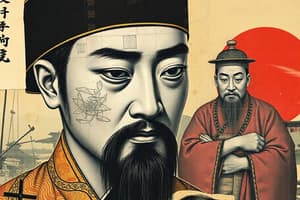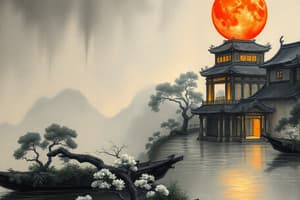Podcast
Questions and Answers
What was the first empire established in the world according to the text?
What was the first empire established in the world according to the text?
- Babylonian Empire
- Assyrian Empire
- Akkadian Empire (correct)
- Neo-Babylonian Empire
Which Chinese empire reunified China and constructed the Grand Canal?
Which Chinese empire reunified China and constructed the Grand Canal?
- Song Empire
- Sui Empire (correct)
- Qin Empire
- Tang Empire
What were the characteristics of an empire mentioned in the text?
What were the characteristics of an empire mentioned in the text?
- No fixed geographic territories, no ruler, and diverse cultures
- Small geographic territories, single ruler, and diverse cultures
- Extensive geographic territories, single ruler, political center, and diverse cultures (correct)
- Limited geographic territories, multiple rulers, and uniform cultures
What was a significant cultural practice during the Song Empire?
What was a significant cultural practice during the Song Empire?
What was the response to the crisis of civilization during the period mentioned in the text?
What was the response to the crisis of civilization during the period mentioned in the text?
During which Chinese empire did Buddhism experience a period of growth?
During which Chinese empire did Buddhism experience a period of growth?
What was the result of successfully developing an empire?
What was the result of successfully developing an empire?
What was one of the consequences of establishing empires?
What was one of the consequences of establishing empires?
Which African empire was known for its unique form of Christianity?
Which African empire was known for its unique form of Christianity?
What was one of the benefits of improving roads and transportation in an empire?
What was one of the benefits of improving roads and transportation in an empire?
What was the capital of the Ghana Empire?
What was the capital of the Ghana Empire?
During the Renaissance, what was the language of the Church?
During the Renaissance, what was the language of the Church?
What was the result of increasing intraregional contact and cultural exchange in an empire?
What was the result of increasing intraregional contact and cultural exchange in an empire?
What was the focus of the Renaissance, according to the text?
What was the focus of the Renaissance, according to the text?
What was one of the ways empires demonstrated their authority and power?
What was one of the ways empires demonstrated their authority and power?
What was a significant change during the Renaissance, according to the text?
What was a significant change during the Renaissance, according to the text?
Who founded the Mauryan Empire?
Who founded the Mauryan Empire?
What was a notable feature of the Gupta Empire?
What was a notable feature of the Gupta Empire?
Which empire was associated with the development of Mahayana Buddhism?
Which empire was associated with the development of Mahayana Buddhism?
Who unified China and established the Qin Empire?
Who unified China and established the Qin Empire?
During which empire did India experience a 'Golden Age'?
During which empire did India experience a 'Golden Age'?
Which dynasty was the last local dynasty before the Muslim conquest of India?
Which dynasty was the last local dynasty before the Muslim conquest of India?
Who was the founder of the Han Empire?
Who was the founder of the Han Empire?
What was a characteristic of the Qin Empire's rule?
What was a characteristic of the Qin Empire's rule?
Flashcards are hidden until you start studying
Study Notes
Chinese Empires
- Qin Empire (221-206 BCE): Founded by Shi Huang Di, unified China, standardized weights and measures, harsh legalist policies, and strict control over critics.
- Han Empire (206 BCE-222 CE): Founded by Liu Bang, expanded territories to Manchuria, Korea, northern India, and parts of Southeast Asia.
- Sui Empire (589-618 CE): Founded by Yang Jian, reunified China, constructed the Grand Canal, and rebuilt the Great Wall.
- Tang Empire (618-907 CE): Founded by Li Yuan, expanded to Southern China, influenced Japan and Korea, and saw a blossoming of Buddhism.
- Song Empire (907-1278 CE): Founded by Zhao Kuanying, struggled against nomadic invasions, weakened traditional aristocracy, and developed Neo-Confucianism.
African Empires
- Axum Empire (c. 100 BCE - 950 CE): Located in present-day Ethiopia, Eritrea, and parts of Sudan, peaked in 4th-6th centuries, and extended influence to the southern Arabian Peninsula.
- Ghana Empire (c. 800-1070 CE): Located in parts of present-day Mauritania and Mali, had productive agriculture, labor specialization, and significant gold resources.
Renaissance
- Era of rebirth in creativity in Europe, marked by changes in politics, society, economy, and culture.
- Focus on classical thinking, Latin, and the works of Aristotle, Euclid, and Ptolemy.
Empires in South Asia
- Mauryan Empire (321-185 BCE): Founded by Chandragupta Maurya, effective governance, well-organized bureaucracy, and adopted Buddhism as the state ideology.
- Kushan Empire (185 BCE-320 CE): Developed Mahayana Buddhism, located in Northern India.
- Gupta Empire (320-540 CE): Founded by Chandragupta I, known as the Golden Age of India, economic prosperity, advancements in learning and culture, and crystallization of Hinduism.
Characteristics of an Empire
- Extensive geographic territories
- Under one single ruler or political authority
- Has a political center
- Has diverse cultures
Empire Building
- Establishment of Empires was a response to the crisis of civilization during that period.
- Crisis: increasing militarism, wars, and territorial conflicts.
- Standardization of uniform practices, such as common language, universal currency, weights and measurements, tax structures, and legal codes.
- Developed state religion or ideology to provide unity.
- Improvement of infrastructure, such as roads, leading to increased communication, trade, migration, and cultural exchange.
Studying That Suits You
Use AI to generate personalized quizzes and flashcards to suit your learning preferences.



